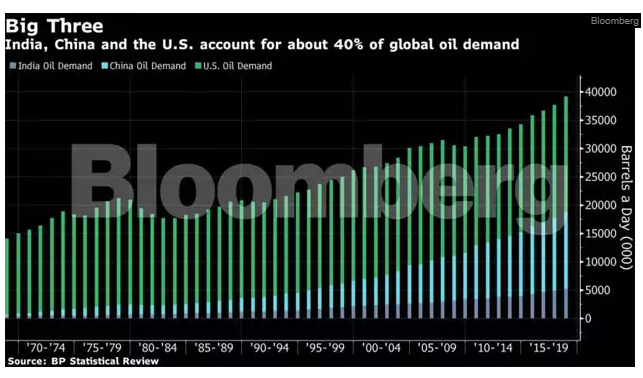
COVID-19 has caused unimaginable destruction, death and misery to millions in a matter of a few months. With more than 1 lakh deaths, 2o lakh plus infected and extended lockdowns, economies across the world are in shambles. Today, many parts of the world resemble a ghost town where you expect zombies to come out of their hideouts anytime – a scene straight out of a Hollywood horror movie.
Even more horrific to imagine, however, is the destruction that the coronavirus crisis will leave in its wake. The aftermath could be more debilitating to the world economy than the battle that we are going through right now. And one of the major victims of the COVID-19 crisis could be the global energy market.
China’s role in oil demand slump
Since March all we have been hearing about in the news is coronavirus’ impact on energy markets causing slump in demand of electricity, petroleum and natural gas. One of the major reasons is China.
China is an economic behemoth and a huge player in the energy industry because of the following reasons:
By virtue of all the three achievements, it is also the largest contributor in worldwide carbon emissions.
When the coronavirus or COVID-19 spread across China, more than 50 million people were under travel restrictions, factories were shut down and there was almost zero industrial activity. Worldwide restriction on air and road travel has led to a tremendous plunge in oil demand which has led to huge falls in oil prices.
According to the International Energy Agency (IEA), worldwide demand for crude oil will slump by a record rate in 2020.[1] Brent crude oil prices, the international benchmark for oil prices, have plummeted from a high of $72 in April 2019 to $27 in April 2020. Understanding this slump in demand of oil is crucial to decoding coronavirus’ impact on energy markets.
India’s impact on oil demand
The United States, India and China accounts for 40% of global oil demand. With already massive lockdowns in place in the US and China, India’s 40-day long lockdown have only exacerbated the problems of the global oil industry. OPEC and other oil-producing countries were already in a fix on how to prevent oil prices from hitting the floor when Indian announced the planet’s largest national lockdown.
THE BIG 3 OIL GUZZLERS

In the first week of April, Bloomberg reported that oil demand in India has plummeted by a record 70% due to the lockdown. The series of lockdowns and this unprecedented slump in demand will bring serious finance turmoil in the domestic and international oil industry. We can fairly assume now that coronavirus’ impact on energy markets will be far-reaching and long-lasting.
Impact on electricity demand
In India 60% of electricity demands come from industry and commercial establishments such as malls, markets and offices. According to reports, electricity demand from industry reduced by 40% and commercial power demand by 35% during the start of the lockdown week in March. [3]
This decline in demand has brought down spot power rates by 30%. Owing to muted demand the domestic power sector may have to deal with revenue downfall and losses in FY21.
Impact on natural gas
Falling oil prices are also causing a decline in natural gas prices and it’s compounded by slump in demand from China. At the end of March 2020, India also reduced the price of natural gas to $2.39 per million British thermal units (mmBtu), the lowest since 2014.
However, this may benefit the end-consumer as it will bring down the cost of urea manufacturing, power generation companies, and CNG and PNG gas buyers. On the negative side, it will adversely impact the revenues of gas producing companies.
Delay in oil and gas projects
The continued lockdown due to the COVID-19 pandemic and unexpected fall in energy prices have resulted in the delay of several India and global oil and gas projects. Deep sea oil and gas projects depend on men, machinery and resources from around the world but mobility restrictions have severely halted new projects. On the other hand, falling prices have led to sluggish cash flows and oil producers are not very keen to explore new areas and ramp up production.
Impact on commodity futures
The coronavirus crisis has also spooked Brent crude futures, natural gas futures and coal futures worldwide leading to a sharp decline in prices of commodity futures. While other commodities futures have seen a sharp surge in prices due to speculators trying to take advantage of the crisis, energy futures have seen a gradual slump.
Since the coronavirus pandemic broke out in China in January 2020, natural gas futures in India have witnessed a decline of more than 13% from January 17, 2020 to April 16, 2020.
The COVID-19 crisis doesn’t augur well for the energy industry which was already battling a price crisis before the outbreak began. Especially, the oil industry can go into deep financial turmoil for an extended period of time owing to this crisis. If the oil industry is hit hard the negative impact can infiltrate into other industries compounding the effects of the global recession that we are soon about to enter.
In spite of all the news about the economic slowdown and recession, it is the best time to get into equity, commodity and derivative trading in India. With Angel One, you can trade across all market segments of BSE, NSE, MCX, MSEI and NCDEX with unlimited access to world-class trading platforms.
Enjoy Zero Brokerage on Equity Delivery
Join our 2 Cr+ happy customers
Enjoy Zero Brokerage on
Equity Delivery